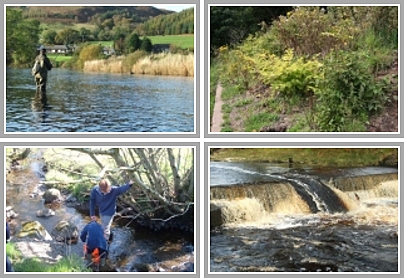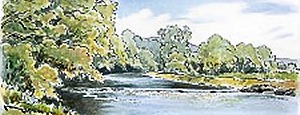Ayrshire Rivers Trust (ART), have secured funding for a 12-week paid trainee placement under the NatureScot’s Working with Rivers Programme. The trainee will receive practical on the job skills development, facilitated by both qualified Trust staff and external training opportunities. The successful applicant will be involved in the delivery of river conservation and management projects including invasive non-native plant control. During the placement they will develop new skills and knowledge, and gain valuable experience that will improve their prospects of future employment within the river conservation sector.
Available Post: 3-month (12 week) trainee placement (37 hours per week).
Starting date: 1st March 2022
Location: ART office Mauchline, covering Ayrshire wide
Salary: £20,532 pro rata, £1711(gross) per month
Closing date for applications: Thursday 10th February (interviews are planned for the 15th/16th Feb)
Criteria stipulated by the funders requires applicants to be:
- Resident in Scotland
- Aged 25 years old or older
- If in work, then transitioning to net zero sectors, or at risk of redundancy; or have been made redundant.
The successful applicant will support Trust staff in river habitat restoration and control of invasive non-native plant species. Skills and knowledge will be developed through involvement in green engineering projects, tree planting, invasive non-native plant control, fishery monitoring, habitat surveys and project development. The trainee will be supported by ART staff and receive appropriate formal training including herbicide spraying and River Restoration courses, as required.
Key tasks for the trainee include:
- Collecting materials for use in river bank and green engineering projects
- Assembling and installing green engineering materials in rivers using hand tools–brash bundles, willow stakes, willow spiling, tree planting with guards and stakes etc.
- Propagating and caring for trees
- Following appropriate training, the trainee will assist with invasive non-native plant species control. The three priority species in Ayrshire are giant hogweed, Japanese knotweed and Himalayan balsam each requiring different approaches and skills.
- Smolt trapping – assisting the biologists to operate smolt traps and record data.
- Fish rescues – the trainee will assist biologists with capturing and handling fish using different techniques available. This work is typically performed using electrofishing methods or Seinne netting depending on the unique situation faced. Training will be provided and possibly formal training given through the Scottish Fisheries Coordination Centre should this be available within the relevant timescales.
- Investigative and environmental monitoring and assisting ART biologists to deliver required surveys – the trainee will assist with monitoring results of our work and with appropriate environmental surveys depending on ART’s current requirements. This may include aerial surveys using drones, walkover surveys, or as part of a team delivering scientific assessments. Appropriate training and supervision will be provided.
- Macroinvertebrate sampling and sorting – macroinvertebrates are a well-used index to determine water quality or long-term changes to water quality. The trainee will assist with collecting macroinvertebrate samples and then processing samples for analysis.
- Project development – the trainee may assist with future project development. They may be expected to gather evidence and justification for future initiatives and assist with applications for funding etc.
- Data entry – The trainee will be expected to participate in data entry. Data collected from surveys is generally entered into our database or catalogued storage systems and this task is shared by all staff.
- Adhering to all health and safety rules and regulations
The successful candidate will be an enthusiastic and self-motivated person and have an aptitude for practical work. An interest in the water environment and ecology is essential. Ideally, they should be able to demonstrate their interest in rivers, river ecology, environmental conservation or similar areas of interest. This may be an interest developed through previous employment, a hobby, interest or education.
Candidates must be willing to work in a small team, contributing enthusiastically to all tasks required. They must be willing to learn new skills including practical conservation/field skills. Working in and around water is required. Familiarity or experience of wading or working in and around water may be beneficial but not essential. Safe working practices are employed within ART and training and safety equipment will be provided.
As this position will focus on outdoor and physical work, candidates must be willing to work in all weathers and be able to cross a wide range of terrain while carrying equipment. They should be physically able and willing to undertake such work in remote areas and environments.
To apply, please send your CV and covering letter explaining why you would be suitable for this trainee placement to Stuart Brabbs at info@ayrshireriverstrust.org by Thursday 10th February 2022.
Working with Rivers is delivered by NatureScot, with National Transition Training Fund support from Skills Development Scotland.
For more information about Ayrshire Rivers Trust, explore our website and search for Ayrshire Rivers Trust on Facebook, Twitter and Youtube.



